
Bible Verse and Prayer for Today;
But I say unto you, Love your enemies, bless them that curse you, do good to them that hate you, and pray for them which despitefully use you, and persecute you.
Matthew 5:44
Prayer
Lord . It's Very Difficult to do this in the Flesh , But Lord doing this in the Spirit is Possible . Please Help us to Live in die Spirit and not in the Flesh , we Pray this in Jesus name . Amen and Amen
Bybel Vers en Gebed vir Vandag
Maar Ek sê vir julle: Julle moet julle vyande liefhê; seën die wat vir julle vervloek; doen goed aan die wat vir julle haat; en bid vir die wat julle beledig en julle vervolg. Matt 5v44
Gebed
Here. Dit is baie moeilik om dit in die vlees te doen, maar Here, om dit in die Gees te doen, is moontlik. Help ons asseblief om in die Gees te leef en nie in die vlees nie. Ons bid dit in Jesus se Naam. Amen en Amen.

Bible Teaching of the Day
“Timing is everything.” This is a maxim that comedians, campaign managers, and marketing directors live by. It indicates that there’s always an ideal time to introduce an idea or perform an action, in order to maximize an intended effect.
In many areas, when one’s timing is off, the likelihood of success is diminished.
“God’s perfect timing” is an aspect of divine sovereignty. In God’s perfect timing, He only acts when it is optimal for what He wants to accomplish in His kingdom. In His omniscience, the Lord sees everything that is going on in the world in any given moment of time—which involves trillions of details that only the Spirit of God can fully grasp.
In the book of Ecclesiastes, King Solomon says, “He [God] has made everything beautiful in its time” (Ecclesiastes 3:11). What does this mean, especially in regard to God’s perfect timing?
The declaration that God has made everything beautiful in its time is preceded by one of the most famous passages in Scripture:
“There is a time for everything,
and a season for every activity under the heavens:
a time to be born and a time to die,
a time to plant and a time to uproot,
a time to kill and a time to heal,
a time to tear down and a time to build,
a time to weep and a time to laugh,
a time to mourn and a time to dance,
a time to scatter stones and a time to gather them,
a time to embrace and a time to refrain from embracing,
a time to search and a time to give up,
a time to keep and a time to throw away,
a time to tear and a time to mend,
a time to be silent and a time to speak,
a time to love and a time to hate,
a time for war and a time for peace” (Ecclesiastes 3:1–8).
In 1965, the folk rock band The Byrds recorded a song, “Turn! Turn! Turn!” that used a portion of this passage and helped contribute to its recognition in pop culture.
Solomon follows his catalog of human experience with the statement that God, in His sovereignty, has made everything beautiful in its time. That is, He optimizes the outcome of all things, both what He has made and the products of mankind’s activity—even the more challenging aspects of human suffering. He does this in a way that is not only glorifying to Him but healing to those who look to Him for peace, purpose, and salvation. In the words of commentator Joseph Benson, God will work all things out “so that, all things considered, it could not have been better” (Commentary on the Old and New Testaments).
There are a multitude of scriptural passages that indicate the perfection and beauty of God’s timing:
“When the set time was fully come, God sent His son” (Galatians 4:4). Jesus introduced his ministry with the words, “The time has come” (Mark 1:15). And we have the promise that “God causes everything to work together for the good of those who love God and are called according to his purpose for them” (Romans 8:28, NLT; see also Genesis 21:2; Isaiah 46:10; 60:22; Habakkuk 2:3; Matthew 24:36; 26:18; John 7:6; 2 Corinthians 6:2; Ephesians 1:10; 1 Thessalonians 5:1; 1 Peter 5:6–7; 2 Peter 3:8; Revelation 1:1).
From a human perspective, God’s timing often does not seem perfect, and it’s hard to see how the events of the world can ever be made “beautiful.” Consider the disappointed reactions of Mary and Martha when Jesus arrived four days after their brother died—after He deliberately delayed His arrival (John 11:1–44).
We are admonished repeatedly in the Bible to “wait on the Lord” (e.g., Psalm 27:14; Hebrews 6:15). Peter tells us to not forget that “with the Lord a day is like a thousand years, and a thousand years are like a day. The Lord is not slow in keeping his promise, as some understand slowness” (2 Peter 3:8). If we are patient and wait on the Lord, we will eventually see the beauty of God’s handiwork—all in His perfect timing.
Bybel Lering vir die Dag
“Tydsberekening is alles.” Dit is ‘n leuse waarvolgens komediante, veldtogbestuurders en bemarkingsdirekteure leef. Dit dui daarop dat daar altyd ‘n ideale tyd is om ‘n idee bekend te stel of ‘n aksie uit te voer om ‘n beoogde effek te maksimeer.
In baie gebiede, wanneer ‘n mens se tydsberekening verkeerd is, word die waarskynlikheid van sukses verminder.
“God se perfekte tydsberekening” is ‘n aspek van goddelike soewereiniteit. In God se perfekte tydsberekening tree Hy slegs op wanneer dit optimaal is vir wat Hy in Sy koninkryk wil bereik. In Sy alwetendheid sien die Here alles wat in die wêreld aangaan op enige gegewe oomblik van tyd – wat triljoene besonderhede behels wat slegs die Gees van God ten volle kan begryp.
In die boek Prediker sê koning Salomo: “Hy [God] het alles mooi gemaak op sy tyd” (Prediker 3:11). Wat beteken dit, veral met betrekking tot God se perfekte tydsberekening?
Die verklaring dat God alles mooi gemaak het op sy tyd, word voorafgegaan deur een van die bekendste gedeeltes in die Skrif:
“Alles het ’n tyd,
en ’n seisoen vir elke ding onder die hemel:
’n tyd om gebore te word en ’n tyd om te sterwe,
’n tyd om te plant en ’n tyd om uit te trek,
’n tyd om dood te maak en ’n tyd om te genees,
’n tyd om af te breek en ’n tyd om te bou,
’n tyd om te ween en ’n tyd om te lag,
’n tyd om te treur en ’n tyd om te dans,
’n tyd om klippe te verstrooi en ’n tyd om hulle bymekaar te maak,
’n tyd om te omhels en ’n tyd om nie te omhels nie,
’n tyd om te soek en ’n tyd om op te gee,
’n tyd om te bewaar en ’n tyd om weg te gooi,
’n tyd om te skeur en ’n tyd om te herstel,
’n tyd om stil te bly en ’n tyd om te spreek,
’n tyd om lief te hê en ’n tyd om te haat,
’n tyd vir oorlog en ’n tyd vir vrede” (Prediker 3:1–8).
In 1965 het die folkrockgroep The Byrds ‘n liedjie, “Turn! Turn! Turn!”, opgeneem wat ‘n gedeelte van hierdie gedeelte gebruik het en gehelp het om by te dra tot die erkenning daarvan in popkultuur.
Salomo volg sy katalogus van menslike ervaring met die stelling dat God, in Sy soewereiniteit, alles mooi gemaak het op sy tyd. Dit wil sê, Hy optimaliseer die uitkoms van alle dinge, beide wat Hy gemaak het en die produkte van die mensdom se aktiwiteit – selfs die meer uitdagende aspekte van menslike lyding. Hy doen dit op ‘n manier wat nie net tot verheerliking van Hom is nie, maar ook tot genesing vir diegene wat na Hom kyk vir vrede, doel en verlossing. In die woorde van kommentator Joseph Benson, sal God alle dinge laat meewerk “sodat dit, alles in ag genome, nie beter kon gewees het nie” (Kommentaar oor die Ou en Nuwe Testamente).
Daar is ‘n menigte Skrifgedeeltes wat die perfeksie en skoonheid van God se tydsberekening aandui:
“Toe die vasgestelde tyd aangebreek het, het God sy Seun gestuur” (Galasiërs 4:4). Jesus het sy bediening ingelei met die woorde: “Die tyd het aangebreek” (Markus 1:15). En ons het die belofte dat “God alles ten goede laat meewerk vir die wat God liefhet en volgens sy voorneme vir hulle geroep is” (Romeine 8:28, NLT; sien ook Genesis 21:2; Jesaja 46:10; 60:22; Habakuk 2:3; Matteus 24:36; 26:18; Johannes 7:6; 2 Korintiërs 6:2; Efesiërs 1:10; 1 Tessalonisense 5:1; 1 Petrus 5:6–7; 2 Petrus 3:8; Openbaring 1:1).
Vanuit ‘n menslike perspektief lyk God se tydsberekening dikwels nie perfek nie, en dis moeilik om te sien hoe die gebeure van die wêreld ooit “pragtig” gemaak kan word. Dink aan die teleurgestelde reaksies van Maria en Marta toe Jesus vier dae nadat hulle broer gesterf het, opgedaag het – nadat Hy doelbewus Sy aankoms vertraag het (Johannes 11:1–44).
Ons word herhaaldelik in die Bybel vermaan om “op die Here te wag” (bv. Psalm 27:14; Hebreërs 6:15). Petrus sê vir ons om nie te vergeet dat “by die Here is een dag soos duisend jaar en duisend jaar soos een dag. Die Here is nie stadig met sy beloftes soos sommige dit vertraag nie” (2 Petrus 3:8). As ons geduldig is en op die Here wag, sal ons uiteindelik die prag van God se handewerk sien – alles op Sy perfekte tydsberekening.

Today’s Devotional
As ministers of the Gospel and Children of God that are Christian Disciples , we are called upon to run the race set before us. But how do we run this race when our energy is depleted, when we are tired, when we are weak, when all we can think about is how we are going to make it through another day? How do we run with perseverance when it seems as if everything goes wrong, and everybody is against us? How do you continue running the race when the family you supported and helped simply decides to leave the church or the young person you prayed for, dies of an incurable disease? How do you continue when you are standing at an open grave, lost for words and unable to explain to the family why good people or even small children are so often torn away from them?
When seeking for answers I was reminded of Hebrews 12:1-2. It reads, “And let us run with perseverance the race marked out for us, fixing our eyes on Jesus, the pioneer and perfecter [author and finisher] of faith.”
And herein lies the answer – we need to keep our eyes fixed on Jesus Christ, the pioneer and perfecter [author and finisher] of faith. In Matthew 14:28-33 we read about Peter walking on the water towards Jesus Christ. While focussing on the Lord, he made headway, but the moment he looked at the waves and the wind he began to sink.
Today I want to encourage you. Jesus said, “If any man serves me, let him follow me.” (John 12:26)
Let us therefor follow Jesus, keep our eyes upon Him, and focus on Him. Though we have not seen him, let us love him. Though we do not see Him now, let us believe in Him. Then we will be filled with an inexpressible and glorious joy. (See 1 Peter 1:8 – 9)
Having been justified through faith, we have peace with God through our Lord Jesus Christ, through whom we have gained access by faith into this grace in which we now stand. We boast in the hope of the glory of God. Not only so, but we also glory in our sufferings, because we know that suffering produces perseverance; perseverance, character; and character, hope. And hope does not put us to shame, because God’s love has been poured out into our hearts through the Holy Spirit, who has been given to us. (See Romans 5:1-5)
Vandag se Bemoediging
As bedienaars van die Evangelie en Kinders van God wat Christelike Dissipels is, word ons geroep om die wedloop wat voor ons lê, te hardloop. Maar hoe hardloop ons hierdie wedloop wanneer ons energie uitgeput is, wanneer ons moeg is, wanneer ons swak is, wanneer al waaraan ons kan dink is hoe ons dit deur nog ‘n dag gaan maak? Hoe hardloop ons met volharding wanneer dit lyk asof alles verkeerd loop, en almal teen ons is? Hoe hardloop jy voort met die wedloop wanneer die gesin wat jy ondersteun en gehelp het, eenvoudig besluit om die kerk te verlaat of die jongmens vir wie jy gebid het, sterf aan ‘n ongeneeslike siekte? Hoe gaan jy voort wanneer jy by ‘n oop graf staan, woordeloos en nie in staat is om aan die gesin te verduidelik waarom goeie mense of selfs klein kindertjies so dikwels van hulle weggeruk word nie?
Toe ek na antwoorde gesoek het, is ek aan Hebreërs 12:1-2 herinner. Dit lui: “En laat ons met volharding die wedloop hardloop wat vir ons lê, die oog gevestig op Jesus, die Leidsman en Voleinder van die geloof.”
En hierin lê die antwoord – ons moet ons oë gevestig hou op Jesus Christus, die Leidsman en Voleinder van die geloof. In Matteus 14:28-33 lees ons van Petrus wat op die water na Jesus Christus toe loop. Terwyl hy op die Here gefokus het, het hy vordering gemaak, maar die oomblik toe hy na die golwe en die wind gekyk het, het hy begin sink.
Vandag wil ek jou bemoedig. Jesus het gesê: “As iemand My dien, laat hom My volg.” (Johannes 12:26)
Laat ons daarom Jesus volg, ons oë op Hom hou en op Hom fokus. Al het ons Hom nie gesien nie, laat ons Hom liefhê. Al sien ons Hom nou nie, laat ons in Hom glo. Dan sal ons vervul word met ‘n onuitspreeklike en heerlike vreugde. (Sien 1 Petrus 1:8-9)
Omdat ons deur die geloof geregverdig is, het ons vrede met God deur ons Here Jesus Christus, deur wie ons deur die geloof toegang verkry het tot hierdie genade waarin ons nou staan. Ons roem in die hoop op die heerlikheid van God. Nie net dit nie, maar ons roem ook in ons lyding, omdat ons weet dat lyding volharding kweek, en volharding egtheid van geloof, en egtheid van geloof hoop. En hoop beskaam ons nie, omdat God sy liefde in ons harte uitgestort het deur die Heilige Gees wat aan ons gegee is. (Sien Romeine 5:1-5)

TruLight Ministries Daily Entertainment

TruLight TV – Gaither – Heavenly Love (A Southern Convention Sing-Along)
Bill & Gloria Gaither joined over 200 Homecoming Friends who united in heart and voice for an old-fashioned, convention-styled, Gospel sing-along. The rafters echoed with sweet harmony and heartfelt praise as the choir sang “Jesus, Hold My Hand,” “Lord, Lead Me On,” “Where No One Stands Alone,” “He’s a Personal Savior” and more. Heavenly Love: A Southern Convention Sing-Along captures messages of joy, encouragement and faith and offers listeners everywhere the opportunity to join in the song.
INTRODUCTION TO THE GOSPEL ARTISTS
MEET : The Wilbanks

The Wilbanks
Terry & Rene’ Wilbanks
Jason & Monica Mathews
We are the Wilbanks!
We are in our 22nd year of full-time touring, ministering through our music in churches, conferences, and special events. We have been privileged to sing on the Main Stage at the National Quartet Convention several times since 2013.
Our music is played nationwide on many radio stations and Sirius/XM Enlighten. We have also been featured on the Gaither Homecoming Radio Program.
Our songs have been in the top Gospel radio charts for ten years with most songs in the top 40, top 30, and a recent song at #18.
We endeavor to reach all cultures through a wide variety of music styles, while exalting our Creator and sovereign God through every song.
We have released eight music videos. You can view them here on our Videos Page, our Facebook page, and our Youtube @The Wilbanks.
Today on TruLight Radio XM

ruLight Radio XM 24/7
Program
GMT / UTC +2
00:15 Words to Live By Testimonies
01.15 Science Scripture and Salvation
02.15 Ground Works
04.00 Gospel Concert of the Day
05.00 The Daren Streblow Comedy Show
5:55 It is Today devotional
6:00 Gaither Homecoming Morning Show
7:15 Discover the Word
8.15 Destined for Victory
8:55 Science Scripture and Salvation
9:00 Holy Spirit Hour – Normally Sermons
10:15 Hope of the Heart
11:15 Unshackled
11.45 Words to Live By
12:15 Truth for Life
13:15 Living on the Edge with Chip Ingram
14:15 Focus on the Family
15:00 Kids Hour
16:00 In Touch with Dr. Charles Stanley
16:30 Groundwork
17:15 Live in the Light
18:15 Renewing your Mind
19:00 Gaither Homecoming Show
20:15 Growing Hope
21:15 Adventures in Odyssey Radio Drama
21:45 Bible Reading
22:15 Night-sounds
23.00 Good Old Country Gospel / Rhema Gospel Express
VISIT THE WEBSITE
https://TruLightRadioXM.org.za

Bible Prophecy in the News
The Drones of the 5th Trumpet are Ready

Rev 9:7 And the shapes of the locusts were like unto horses prepared unto battle; and on their heads were as it were crowns like gold, and their faces were as the faces of men.
Rev 9:8 And they had hair as the hair of women, and their teeth were as the teeth of lions.
Rev 9:9 And they had breastplates, as it were breastplates of iron; and the sound of their wings was as the sound of chariots of many horses running to battle.
Rev 9:10 And they had tails like unto scorpions, and there were stings in their tails: and their power was to hurt men five months.
Rev 9:11 And they had a king over them, which is the angel of the bottomless pit, whose name in the Hebrew tongue is Abaddon, but in the Greek tongue hath his name Apollyon.
Rev 9:12 One woe is past; and, behold, there come two woes more hereafter.
Bible Prophecy in the News = It’s Not Sci-Fi Anymore: China’s Drone Mothership Is Ready For War
Last week, Chinese state media unveiled a fearsome new tool of modern warfare: the Jiu Tun, a flying “mothership” capable of launching 100 kamikaze drones in seconds.
The battlefield of tomorrow is not waiting for tomorrow. It’s here–and it’s airborne.
Last week, Chinese state media unveiled a fearsome new tool of modern warfare: the Jiu Tun, a flying “mothership” capable of launching 100 kamikaze drones in seconds. Sleek, stealthy, and ominously named “Sky High,” this 82-foot wingspan aircraft is not just another drone–it’s a drone launcher, a high-altitude arsenal capable of raining down coordinated, intelligent, and lethal swarms with stunning speed and precision.
This is not a hypothetical weapon. It exists. It flies. And it could redefine the future of war–particularly for the United States Navy, whose aircraft carriers may soon face threats for which no current defense is sufficient.
The Drone Swarm Revolution
Imagine a hundred self-destructing drones descending like locusts on a carrier group in the Pacific–overwhelming radars, jamming comms, targeting antennas, runways, and weapons systems all at once. This isn’t science fiction; this is China’s playbook for the next-generation battlefield.
Military analysts have long feared the day when swarms of autonomous drones could flood American defenses. Now, that day may be here.
China’s Jiu Tun UAV doesn’t just carry drones–it’s a combat-capable, high-altitude, radar-evading warplane that can also deploy missiles. But it’s the swarm capacity that changes the game. A coordinated drone strike could take down or blind key naval assets before they can react, including billion-dollar aircraft carriers. In essence, China has built a weapon whose main tactic is overload–overwhelming sensors, saturating defenses, and making high-cost ships vulnerable to low-cost, high-volume attacks.
That’s warfare math, and it doesn’t favor us.
Why Americans Should Care
If you’re reading this thinking, “But we’re the United States–we have the best military on Earth,” you’re not wrong. But you may be missing the bigger picture: Warfare is changing faster than our doctrine.
Just as smartphones disrupted communication and AI is reshaping business, drones are rewriting the rules of combat. In Ukraine, small FPV (First-Person View) drones have been responsible for 80% of Russian casualties, according to U.S. Rep. Pat Harrigan. And that’s using cheap tech. Now imagine what a nation with China’s resources, AI integration, and manufacturing scale can do.
And they’re doing it.
Jiu Tun isn’t a one-off. It’s part of a massive, methodical Chinese investment in unmanned warfare, from transport drones to stealth reconnaissance to loitering munitions. Beijing is signaling loud and clear: We will dominate the sky–not with one fighter jet, but with a thousand eyes, brains, and bombs flying autonomously.
America’s fleets, with their massive signature and centralized command, are increasingly vulnerable to swarming tactics. It’s like bringing a castle to a gunfight–with the enemy armed with a cloud of flying arrows.
Strategic Implications for the U.S.
Make no mistake, China’s drone mothership is a message–to Taiwan, to Japan, and especially to Washington.
The U.S. has long relied on air and naval dominance in the Indo-Pacific. But China’s Jiu Tun, coupled with its rapidly growing missile arsenal and cyber capabilities, is building a denial-of-access zone–a kill box–where U.S. forces would struggle to operate freely.
Drone swarms are notoriously difficult to stop. Unlike manned aircraft, they don’t need to return home. They can fly in erratic patterns, communicate with each other, and sacrifice themselves en masse to destroy valuable targets.
In essence, China isn’t just preparing for war. It’s preparing to win fast–with technology that overwhelms, confuses, and disables.
Time to Wake Up
Let’s be blunt: America’s deterrence posture cannot rest on nostalgia. Our adversaries are innovating. We’re upgrading, but they’re leapfrogging.
Yes, we have unmatched aircraft like the F-35 and the MQ-9 Reaper. But the Jiu Tun doesn’t fight like them. It thinks differently. It is different. And unless we shift our thinking, we could find ourselves in the same spot as 20th-century battleships when aircraft carriers first took to sea: impressive, proud–and obsolete.
We need to fast-track our own drone swarm capabilities, invest in directed-energy weapons, and rethink our carrier-centered doctrine in the Pacific. The future won’t wait. And neither will our adversaries.
The Real War Isn’t Drones–It’s Denial
The danger is not just that China builds a better drone. The danger is that Americans keep scrolling past headlines like this one, thinking this is a faraway problem, a Pentagon issue, a “next war” scenario.
But the truth is: the next war is already taking shape, and it’s one America might lose–not because we’re weaker, but because we’re slower to change.
If you care about national security, about freedom of the seas, about the future of American power–you should be paying attention. The sky is swarming. Are we ready?
Learn more in the video below:
Signs of the Times
The West’s Assault On The Christian African Family
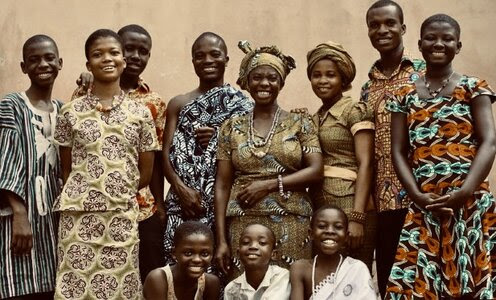
Over the past 100 years, Christianity has faded in the lands that once cultivated it. Even more, a subtle and dangerous shift has developed in the last several decades — the West has begun to actively work against biblical principles in the lands to which it once sent missionaries. And the Christians in Africa feel it.
In 1900, there were 9.6 million Christians in Africa. As of 2025, there are over 754 million. This alone is a staggering figure. But it’s even more significant as we examine it in relation to Christianity in other regions of the globe. With just under 552 million Christians in Europe, just under 417 million in Asia, and 620 million in Latin America, Africa already leads the Christian world in terms of population. And it is set to keep growing.
Sub-Saharan Africa is the only region of the world currently exceeding the population replacement birth rate, which is also encouraging for African Christianity, as believing parents have more children and raise them as Christians. While these numbers do not assess the vitality and strength of the faith of those they are counting — considering that African churches are standing stronger than Western churches on key, contested biblical truths of marriage and family — at least on this issue the convictional level of Christianity is higher in Africa than the West. Of course, the above doesn’t account for how the Lord may move in these regions and bring revival, but these numbers represent the current state of Christianity globally.
Are we prepared for this shift? Do we recognize it? Most of us, due to habit, education, training, or culture, may be inclined to still think of the West (Europe, the United States, and the Commonwealth countries of the U.K., Canada, Australia, and New Zealand) as the “Christian world.” Historically, that is true. Europe and the lands it settled have predominated as the center of global Christianity for hundreds of years, giving birth to biblically-influenced arts, science, and education, the Reformation, America’s own founding, and sending missionaries around the globe — including to Africa within the last two centuries.
But the West has not kept pace. Over the past 100 years, Christianity has faded in the lands that once cultivated it. Even more, a subtle and dangerous shift has developed in the last several decades — the West has begun to actively work against biblical principles in the lands to which it once sent missionaries. And the Christians in Africa feel it. I heard it from their own mouths over the past week.
Perhaps no subject loomed larger over the Pan-African Conference for Family Values, held May 12-14 in Nairobi, Kenya, than what the West has done to target the African family in recent years. This gathering was the second such one hosted by the Africa Christian Professionals Forum, convening Christian faith leaders and advocates for biblical values in law and policy from around the continent. The focus was the family and key contested areas of life, marriage, family, sexuality, and religious freedom. What has the “Christian West” done for the African family?
As far as the Africans at this conference are concerned, the West has not been helping; indeed, it has been actively working against their families. Their primary source of pain is that the boatloads of money that have been pumped into the continent to kill their unborn children (by promoting abortion) and attack the integrity of the human person and undermine marriage and family (by promoting LGBT ideology) have come from … the West.
Not only that, but the way in which this money is coming in is coercive. African government leaders are having their arms twisted by Western diplomats and NGOs and told that if they don’t agree to allow abortion and LGBT ideology, they aren’t going to get the financial aid they often so desperately need.
This happened in the past six months in Sierra Leone, which the Biden administration told it wouldn’t get aid unless it passed a pro-abortion law. At the conference, I heard anecdotally from one Kenyan leader that “the week after Biden was elected” in 2020, LGBT groups and advocacy efforts “showed up” in the country. I heard how Malawi political leaders were taken aside by abortion groups and lobbied to pass an abortion bill. Christian taxpayers in the United States are having their money held over the heads of their fellow believers in Africa and used to pressure them to disavow the truths about their faith.
It would be bad enough that the West is taking positions that undermine the African family, but the malicious nature and arm-twisting of it all makes it that much more exploitative, closer to a coercive interrogation in which a subject is situated in a closed room and information is extracted from him or her under conditions of pressure. Only now, the interrogators are Western governments, and the detainees are Africans.
Layer on top of this the colonial history of the West coming to exploit, dictate, and control African people and resources, with Africa still struggling to break free of these bonds — and it only makes the current situation worse and more traumatizing. Only this “new colonialism” comes in the form of white Western elites attacking the biblical view of the family in Africa. No matter what those who attempt to twist the facts may say, it is white Westerners now coming once again to tell Africans what they need — or else.
Those who want to twist this truth must face the facts: who founded Planned Parenthood? A white woman named Margaret Sanger, a eugenicist who thought black people needed to stop having babies. Today, International Planned Parenthood Federation is one of the leading promoters of abortion in Africa. Marie Stopes is led by … white Western elites. The list goes on.
An overwhelming amount of the money being funneled like a river into Africa from Western governments and allied NGOs concerning issues of family, marriage, and human sexuality is being used to directly work against the biblical foundations of the family that God instituted in Genesis 1-2. The created order is being attacked in Africa, and Africans are feeling it.
This is why participants in the Pan-African Conference on Family Values gathered. They want to do something about it by identifying and describing the problem and strategizing and resourcing the way ahead. For my part, I acknowledged what my own country and others have done to undermine the family and apologized and repented for our behavior toward these fellow believers in Africa. I let them know that many faithful Christians in the United States who still hold to the whole counsel of God’s word are standing with them on the truth of Genesis 1-2, as they face this destruction coming from the West.
The West’s entire effort in this regard contradicts the normal rules of diplomacy, which prescribe actions to improve a bilateral relationship, and whereby one seeks to cultivate a good image in the hearts and minds of the people and government of the host country. In this case, Western capitals are coercively arm-twisting with zeal in order to plant abortion and LGBT ideology in African countries, alienating their people and governments and making them open to advances from China and others.
Because Western abortion and LGBT advocates know Africans don’t want to accept those policies, much of their work is done deceptively. The law, language, and aid packages offered by the West may not on first glance say “abortion” or “LGBT.” But dig and scrape beneath the surface a little further, and when it concerns family issues, they are often there, sometimes hidden beneath innocuous-sounding language.
All of this points toward the spiritual nature of what is happening. Sexual ideologies are a religion in the West, and the West is quite logically zealously proselytizing what it believes. And in a spiritual war, the answer is prayer — the people of God must seek direction from God on how to proceed.
The heartening part of being with these African Christian brothers and sisters was seeing the vitality and conviction of their faith. Many are being called by the Lord and stepping forward into key roles, whether serving in government, advising the government from outside, getting into activism, or serving, counseling, and supporting families, parents, and children as they walk out trying to heal the family destruction often imported by the West – including our entertainment, pop culture, and media.
As I reminded the participants at the conference, just because something has come from the West does not mean it is good. It must be biblical to be good. And just because the West has sent many missionaries in the past does not mean that people coming from the West will continue to bring good things — indeed, as many are seeing, tragically they are bringing harm.
Yet this conference brought solidarity between the African believers called to defend God’s word in the public spaces, and those in the United States with a similar call. It was tremendously encouraging to be with them and know that we are in this together, as we lock arms with the joy and presence of the Holy Spirit. Indeed, we know God wants to perfect his church — his body — and it is a global body. The Pan-African Conference on Family Values saw this unification of the Body of Christ that our God desires continue in a fresh way.
As I leave Africa, I know the Holy Spirit is leading these brothers and sisters in the Lord, as I can testify to what I saw, heard, and felt during the few days there. We know God is always looking for those who will step forward and defend what he wants to defend — whether in English, Swahili (the mother tongue of Kenya), and in every other language under the sun. And in this matter, as we approach the day when peoples of all tribes, tongues, and nations will gather as one to worship the lamb, we can start to gather now.
As we each bear witness to where God has placed us, we remember that we are only testifying to what God has already said in the beginning about his creation — that he brought forth life on the earth, that he created us male and female in his image, to be joined together as one man and one woman in marriage — and that it was good. The truth of what we testify to is clear. It is simple. Let us not make it difficult. The question is: do we have the courage and conviction to do it?
Gog and Magog Update
The Great Betrayal: Western Powers Will Turn On Israel During June Conference
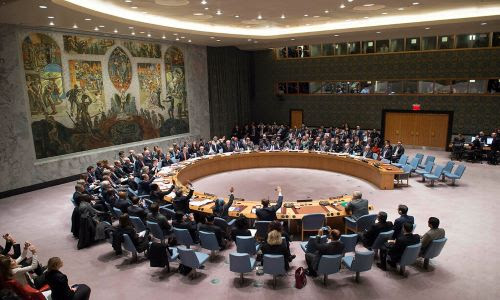
In a move that should alarm every Bible-believing Christian and supporter of Israel, world leaders are gathering under the banners of France and Saudi Arabia this June to press forward with a plan that threatens the very survival of the Jewish state: the unilateral recognition of a Palestinian state.
Places in the Bible
Jezreel
Also known as Tel Jezreel, Tel Yizer’el, Esdraelon, Zerin, Zer’in, Zertîn
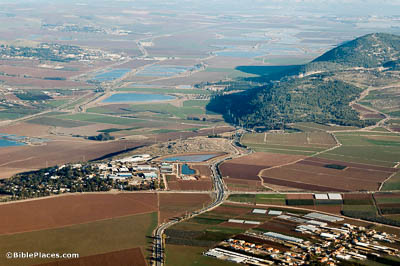
A Strategic Location
Jezreel was a city of the tribe of Issachar (Josh 19:18). The city was located within the Fifth Solomonic District (1 Kgs 4:12). The natural hill on which Jezreel sits is located on the western end of Mount Gilboa. It acts as a sentinel guarding the passage from the Jezreel Valley into the Harod Valley and beyond to the Jordan Valley. It also guards the descent from the hills of Samaria into the Jezreel Valley. Tel Jezreel is located 12 miles (19 km) south of Nazareth.
Saul’s Final Battle
Saul gathered the Israelites at Jezreel against the Philistine armies when they were moving from Aphek (1 Sam 29:1). From here he went to Endor. After losing the battle, Saul fled to Gilboa, where he died. His body was hung on the walls of Beth Shean and the Jabesh-Gileadites then came to get his body.
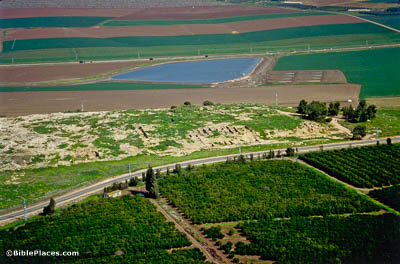
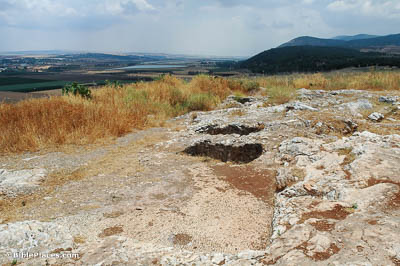
Ahab and Naboth’s Vineyard
In addition to his palace in Samaria, Ahab maintained a palace in Jezreel (1 Kgs 21:1). Because of the low elevation of Jezreel, this would have served well as a winter palace. In 1 Kings 21, Ahab took Naboth’s vineyard. The vineyard was next to the palace, and was very valuable land. The fertile ground in the valley today is a reminder of how precious Naboth’s fertile vineyard would have been. This photo shows an ancient winepress on the eastern side of the city of Jezreel.
Excavations of Tel Jezreel
Excavations of Tel Jezreel were conducted by John Woodhead of the British School of Archaeology and David Ussishkin of Tel Aviv University in 1990–1995. There were high expectations for this site because it was the last royal site to be excavated, but the results were disappointing because the stones had been robbed out in previous periods. In the 9th century BC, it is clear that the site was developed under a new plan. Although much is still uncertain about the site, it has been shown that the city of Jezreel was a very well-planned city and the work must have required a large investment of financial as well as human resources. This photo shows grapevines growing at the site, reminiscent of Naboth’s vineyard that was located not far from this spot.

TruLight Ministry News

TruLight Ministries orders from God since 2012 . Teach Them , Comfort Them and Warn Them!
////////////
TruLight Ministries opdrag vanaf God sedert 2012. Leer hulle, Troos hulle en Waarsku hulle!
Pastoor Dirk se Audio Lering : Eindtyd Studie 2 van 11 .
TruLight School of Theology have started with Its daily Bible Study – Pastor Counselling Certificate – we are Starting with 36 Studies with 10 Studies per Topic from 1st of April 2025 – Over the Next 2 Years we will Include One Daily Study per Topic on this Platform. The Daily Manna Bible Study will be Available in English and Afrikaans!
We will Start with a 68 week Study on “Know Your Bible” Daily Bible Summaries of every Chapter in the Bible! From the Old Testament to the New Testament , from Genesis to Revelation 66 Books of the Bible.
Started 1st April 2025
This is our Study Principals:
SOAP
Scripture: Read a short passage out loud.
Observation: What do you notice about the verses?.
Application: How can you apply this to your life?.
Prayer: Pray about what you’ve learned.
REAP
Read: Read the passage carefully.
Engage: Ask questions about the passage.
Apply: Think about how the passage applies to your life.
Pray: Pray about what you’ve learned.
Introduction to the Bible – Bible Summary
Summary of the Gospel of Luke
Author: The Gospel of Luke does not identify its author. From Luke 1:1-4 and Acts 1:1-3,
it is clear that the same author wrote both Luke and Acts, addressing both to “most
excellent Theophilus,” possibly a Roman dignitary. The tradition from the earliest days of
the church has been that Luke, a physician and a close companion of the Apostle Paul,
wrote both Luke and Acts (Colossians 4:14; 2 Timothy 4:11). This would make Luke the
only Gentile to pen any books of Scripture.
Date of Writing: The Gospel of Luke was likely written between A.D. 58 and 65.
Purpose of Writing: As with the other two synoptic gospels—Matthew and Mark—this
book’s purpose is to reveal the Lord Jesus Christ and all He “began to do and to teach
until the day he was taken up to heaven” (Acts 1:1-2). The Gospel of Luke is unique in
that it is a meticulous history—an “orderly account” (Luke 1:3) consistent with Luke’s
medical mind—often giving details the other accounts omit. Luke’s history of the life of
the Great Physician emphasizes His ministry to—and compassion for—Gentiles,
Samaritans, women, children, tax collectors, sinners, and others regarded as outcasts in
Israel.
Key Verses:
Luke 2:4-7: “So Joseph also went up from the town of Nazareth in Galilee to Judea, to
Bethlehem the town of David, because he belonged to the house and line of David. He
went there to register with Mary, who was pledged to be married to him and was
expecting a child. While they were there, the time came for the baby to be born, and she
gave birth to her firstborn, a son. She wrapped him in cloths and placed him in a
manger, because there was no room for them in the inn.”
Luke 3:16, “John answered them all, ‘I baptize you with water. But one more powerful
than I will come, the thongs of whose sandals I am not worthy to untie. He will baptize
you with the Holy Spirit and with fire.'”
Luke 4:18-19, 21: “‘The Spirit of the Lord is on me, because he has anointed me to
preach good news to the poor. He has sent me to proclaim freedom for the prisoners
and recovery of sight for the blind, to release the oppressed, to proclaim the year of the
Lord’s favor.’ Today this scripture is fulfilled in your hearing.”
Luke 18:31-33: “Jesus took the Twelve aside and told them, ‘We are going up to
Jerusalem, and everything that is written by the prophets about the Son of Man will be
fulfilled. He will be handed over to the Gentiles. They will mock him, insult him, spit on
him, flog him and kill him. On the third day he will rise again.’”
Luke 23:33-34: “When they came to the place called the Skull, there they crucified him,
along with the criminals—one on his right, the other on his left. Jesus said, ‘Father,
forgive them, for they do not know what they are doing.’”
Luke 24:1-3: “On the first day of the week, very early in the morning, the women took
the spices they had prepared and went to the tomb. They found the stone rolled away
from the tomb, but when they entered, they did not find the body of the Lord Jesus.”
Brief Summary: Called the most beautiful book ever written, the Gospel of Luke begins
by telling us about Jesus’ parents; the birth of His cousin, John the Baptist; Mary and
Joseph’s journey to Bethlehem, where Jesus is born in a manger; and the genealogy of
Christ through Mary. Jesus’ public ministry reveals His perfect compassion and
forgiveness through the stories of the prodigal son, the rich man and Lazarus, and the
Good Samaritan. While many believe in this unprejudiced love that surpasses all human
limits, many others—especially the religious leaders—challenge and oppose the claims
of Jesus. Christ’s followers are encouraged to count the cost of discipleship, while His
enemies seek His death on the cross. Finally, Jesus is betrayed, tried, sentenced and
crucified. But the grave cannot hold Him! His Resurrection assures the continuation of
His ministry of seeking and saving the lost.
Connections: Since Luke was a Gentile, his references to the Old Testament are
relatively few compared to those in Matthew’s gospel, and most of the OT references
are in the words spoken by Jesus rather than in Luke’s narration. Jesus used the Old
Testament to defend against Satan’s attacks, answering him with “It is written” (Luke 4:1-
13); to identify Himself as the promised Messiah (Luke 4:17-21); to remind the Pharisees
of their inability to keep the Law and their need of a Savior (Luke 10:25-28, 18:18-27);
and to confound their learning when they tried to trap and trick Him (Luke 20).
Practical Application: The Gospel of Luke gives us a beautiful portrait of our
compassionate Savior. Jesus was not “turned off” by the poor and the needy; in fact,
they were a primary focus of His ministry. Israel at the time of Jesus was a very classconscious
society. The weak and downtrodden were literally powerless to improve their
lot in life and were especially open to the message that “the kingdom of God is near
you” (Luke 10:9). This is a message we must carry to those around us who desperately
need to hear it. Even in comparatively wealthy countries—perhaps especially so—the
spiritual need is dire. Christians must follow the example of Jesus and bring the good
news of salvation to the spiritually poor and needy. The kingdom of God is near and the
time grows shorter every day.
Inleiding tot die Bybel – Bybel Samevatting
Opsomming van die Evangelie
van Lukas
Skrywer: Die Evangelie van Lukas identifiseer nie die skrywer daarvan nie. Uit Lukas 1:1-
4 en Handelinge 1:1-3 is dit duidelik dat dieselfde skrywer beide Lukas en Handelinge
geskryf het, en beide gerig is aan “uitnemendste Theophilus”, moontlik ‘n Romeinse
hooggeplaaste. Die tradisie van die vroegste dae van die kerk was dat Lukas, ‘n
geneesheer en ‘n hegte metgesel van die apostel Paulus, beide Lukas en Handelinge
geskryf het ( Kolossense 4:14 ; 2 Timoteus 4:11 ). Dit sou Lukas die enigste nie-Jood
maak wat enige Skrifboeke neerpen.
Datum van Skrywe: Die Evangelie van Lukas is waarskynlik tussen 58 en 65 nC geskryf.
Doel van Skrywe: Soos met die ander twee sinoptiese evangelies—Matteus en
Markus—is hierdie boek se doel om die Here Jesus Christus te openbaar en alles wat Hy
“begin het om te doen en om te leer tot die dag toe Hy na die hemel opgeneem is” (
Handelinge 1:1-2 ). Die Evangelie van Lukas is uniek in die sin dat dit ‘n noukeurige
geskiedenis is – ‘n “ordelike verslag” ( Lukas 1:3 ) wat ooreenstem met Lukas se mediese
verstand – wat dikwels besonderhede gee wat die ander verslae weglaat. Lukas se
geskiedenis van die lewe van die Groot Geneesheer beklemtoon Sy bediening aan – en
deernis vir – heidene, Samaritane, vroue, kinders, tollenaars, sondaars en ander wat in
Israel as uitgeworpenes beskou word.
Sleutelverse:
Lukas 2:4-7 : “So het Josef ook van die stad Nasaret in Galilea opgetrek na Judea, na
Betlehem, die stad van Dawid, omdat hy aan die huis en geslag van Dawid behoort het.
Hy het daarheen gegaan om te registreer by Maria, wat belowe was om met hom
getroud te wees en ‘n kind verwag het. Terwyl hulle daar was, het die tyd aangebreek
dat die baba gebore moes word, en sy het geboorte gegee aan haar eersgeborene, ‘n
seun. Sy het hom in doeke toegedraai en hom in ’n krip neergesit, want daar was nie
plek vir hulle in die herberg nie.”
Lukas 3:16 “Johannes antwoord hulle almal: Ek doop julle met water. Maar een sal kom
wat sterker is as Ek, wie se skoene ek nie waardig is om los te maak nie. Hy sal julle doop
met die Heilige Gees en met vuur .'”
Lukas 4:18-19 , 21 : “‘Die Gees van die Here is op My, omdat Hy My gesalf het om die
goeie nuus aan die armes te verkondig. Hy het my gestuur om vryheid uit te roep vir die
gevangenes en herstel van gesig vir blindes, om die verdruktes vry te laat, om die
genadejaar van die Here aan te kondig.’ Vandag is hierdie Skrif in julle ore vervul.”
Lukas 18:31-33 : “Jesus het die Twaalf eenkant toe geneem en vir hulle gesê: Ons gaan
op na Jerusalem, en alles wat deur die profete oor die Seun van die mens geskryf is, sal
wees. vervul word, sal Hy uitgelewer word aan die heidene. Hulle sal hom bespot, op
hom spoeg en hom doodmaak.'”
Lukas 23:33-34 . by die plek gekom wat die Skedel genoem word, daar het hulle Hom
saam met die misdadigers gekruisig—die een aan sy regterkant, die ander aan sy
linkerkant, het Jesus gesê: ‘Vader, vergeef hulle, want hulle weet nie wat hulle doen nie.’
Lukas 24:1-3 : “Op die eerste dag van die week, baie vroeg in die oggend, het die vroue
die speserye wat hulle voorberei het geneem en na die graf gegaan. Hulle het gevind
dat die klip van die graf weggerol is, maar toe hulle ingaan , hulle het die liggaam van
die Here Jesus nie gevind nie.”
Kort opsomming: Die Evangelie van Lukas, wat die mooiste boek genoem word wat
nog ooit geskryf is, begin deur ons te vertel van Jesus se ouers; die geboorte van Sy
neef, Johannes die Doper; Maria en Josef se reis na Betlehem, waar Jesus in ‘n krip
gebore word; en die geslagsregister van Christus deur Maria. Jesus se openbare
bediening openbaar Sy volmaakte deernis en vergifnis deur die verhale van die verlore
seun, die ryk man en Lasarus, en die barmhartige Samaritaan. Terwyl baie glo in hierdie
onbevooroordeelde liefde wat alle menslike perke oorskry, daag en verset baie ander –
veral die godsdienstige leiers – die aansprake van Jesus. Christus se volgelinge word
aangemoedig om die koste van dissipelskap te bereken, terwyl Sy vyande Sy dood aan
die kruis soek. Uiteindelik word Jesus verraai, verhoor, gevonnis en gekruisig. Maar die
graf kan Hom nie hou nie! Sy Opstanding verseker die voortsetting van Sy bediening om
verlorenes te soek en te red.
Verbindings: Aangesien Lukas ‘n heiden was, is sy verwysings na die Ou Testament
relatief min in vergelyking met dié in Matteus se evangelie, en die meeste van die OT
verwysings is in die woorde wat Jesus gespreek het eerder as in Lukas se vertelling.
Jesus het die Ou Testament gebruik om teen Satan se aanvalle te verdedig en hom
geantwoord met “Daar is geskrywe” ( Lukas 4:1-13 ); om Homself as die beloofde
Messias te identifiseer ( Luk 4:17-21 ); om die Fariseërs te herinner aan hulle onvermoë
om die Wet te onderhou en hulle behoefte aan ‘n Verlosser ( Luk. 10:25-28 , 18:18-27 );
en om hulle geleerdheid te verwar toe hulle probeer het om Hom vas te trek en te mislei
( Luk. 20 ).
Praktiese Toepassing: Die Evangelie van Lukas gee vir ons ‘n pragtige portret van ons
deernisvolle Verlosser. Jesus is nie “afgeskakel” deur die armes en behoeftiges nie;
trouens, hulle was ‘n primêre fokus van Sy bediening. Israel in die tyd van Jesus was ‘n
baie klasbewuste samelewing. Die swakkes en verdruktes was letterlik magteloos om hul
lot in die lewe te verbeter en was veral oop vir die boodskap dat “die koninkryk van God
naby jou is” ( Lukas 10:9 ). Dit is ‘n boodskap wat ons moet uitdra aan diegene rondom
ons wat dit desperaat moet hoor. Selfs in betreklik ryk lande – miskien veral so – is die
geestelike nood erg. Christene moet die voorbeeld van Jesus volg en die goeie nuus van
verlossing aan die geestelik armes en behoeftiges bring. Die koninkryk van God is naby
en die tyd word elke dag korter.
We are Currently reading and Listening to the Bible, a Chapter a Day !
The total number of chapters in the Bible is 1,189. There are 929 chapters within 39 books of the Old Testament and 260 chapters within the 27 books of the New Testament.
Genesis 46 / 47 English – Follow the Reading in Your Bible.
Genesis 46 / 47 Afrikaans – Volg die Leser in u Bybel.
Something New Coming June 2025 to this APP

Healing Articles Coming soon
Share this Feeding of Manna with your Friends and Family. just click on the Social Media icon and share !